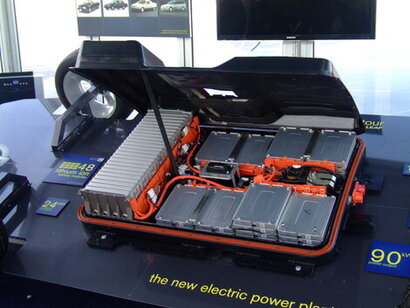
The collaboration will use advanced recycling technologies to lower the carbon footprint of new batteries and reduce reliance on imported raw materials.
The innovative work is part of a £30 million collaborative project announced today by the Advanced Propulsion Centre (APC), which has been awarded grant funding of £15 million. The programme will strengthen the technical expertise and R&D capability of the Nissan Technical Centre Europe (NTCE) in Cranfield, Bedfordshire, focusing on the development and advancement of EV battery reuse, recycling and energy balancing technology.
The consortium also includes battery producer AESC, a long-standing partner of Nissan, and Connected Energy, a leading provider of second-life battery energy storage solutions in the UK.
Building on Altilium’s pioneering development of proprietary green processing technologies, the two companies will work together to maximise the potential for raw material recycling and develop a "closed-loop" model for battery materials, thus reducing the need for mining and saving natural resources. This will include processing waste from spent Nissan leaf batteries and production scrap and then upcycling these materials to produce high nickel chemistry cathode active materials (CAM) for testing in the next generation of EV batteries.
“The collaboration with Nissan, AESC and Connected Energy marks a significant milestone in our mission to create a sustainable ecosystem for EV batteries” said Dr Christian Marston, co-founder and COO of Altlium. “Together, we are leveraging our strengths and resources to revolutionise how we manage and repurpose EV batteries, ensuring the UK has a domestic and sustainable source of battery materials for low carbon transportation.”
The joint endeavour aims to establish a comprehensive, circular approach to managing EV batteries, ensuring minimal environmental impact and maximising resource efficiency.
Altilium’s proprietary EcoCathode hydrometallurgical process can recover over 95 percent of the cathode metals, including lithium, from end-of-life EV batteries. These recovered materials aren't just recycled; they're re-engineered and upcycled to high nickel CAM, ensuring their seamless integration into new batteries. By upcycling these critical materials, the company aims to reduce the carbon footprint in CAM by 50 percent and the cost by 20 percent, compared to virgin mined materials.
The support from the APC underscores the importance of public-private partnerships in driving the development of zero-emission technologies and building a sustainable EV supply chain in the UK. This financial backing will enable Altilium to accelerate the scale-up of its cutting-edge recycling facilities, including the planned construction of the UK’s first industrial scale recycling planet in Teesside.
Altilium’s full battery circularity model will provide a unique customer offering in the UK, encompassing zero carbon EV battery collection, black mass recycling and chemical refining to produce 30,000 MT of battery-ready CAM, enough to meet 20 percent of UK requirement by 2030.
For additional information:

